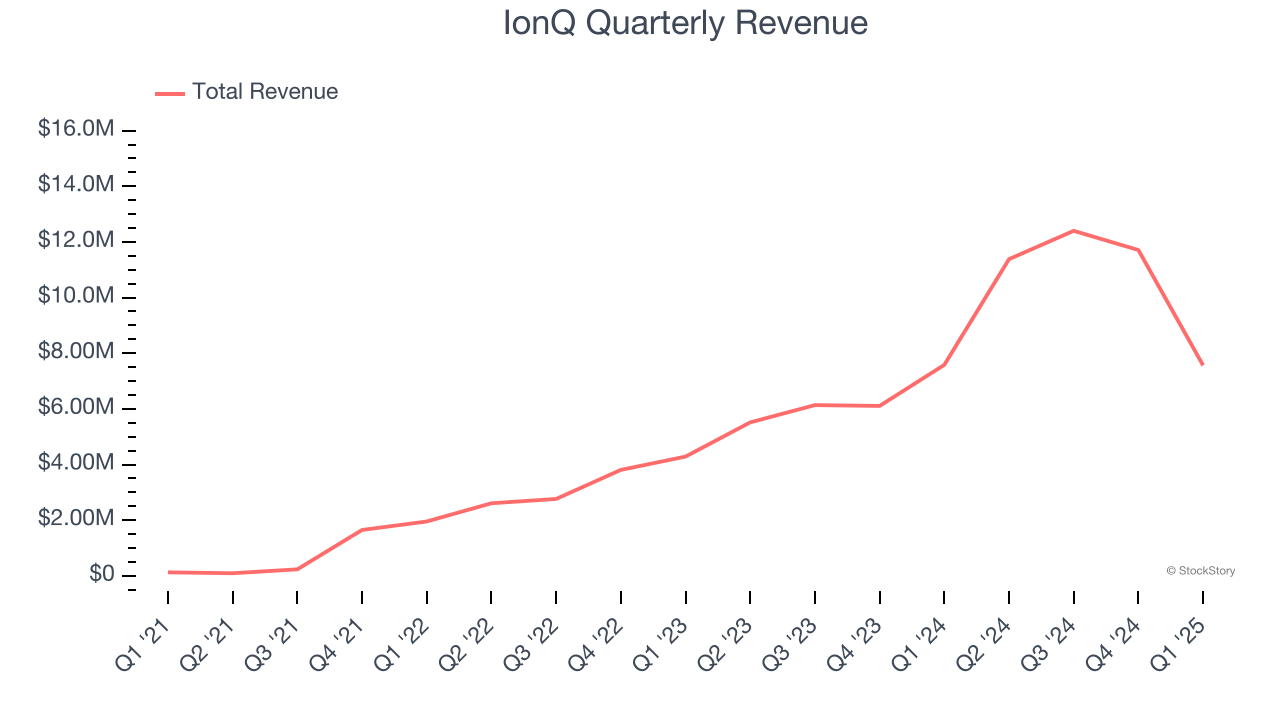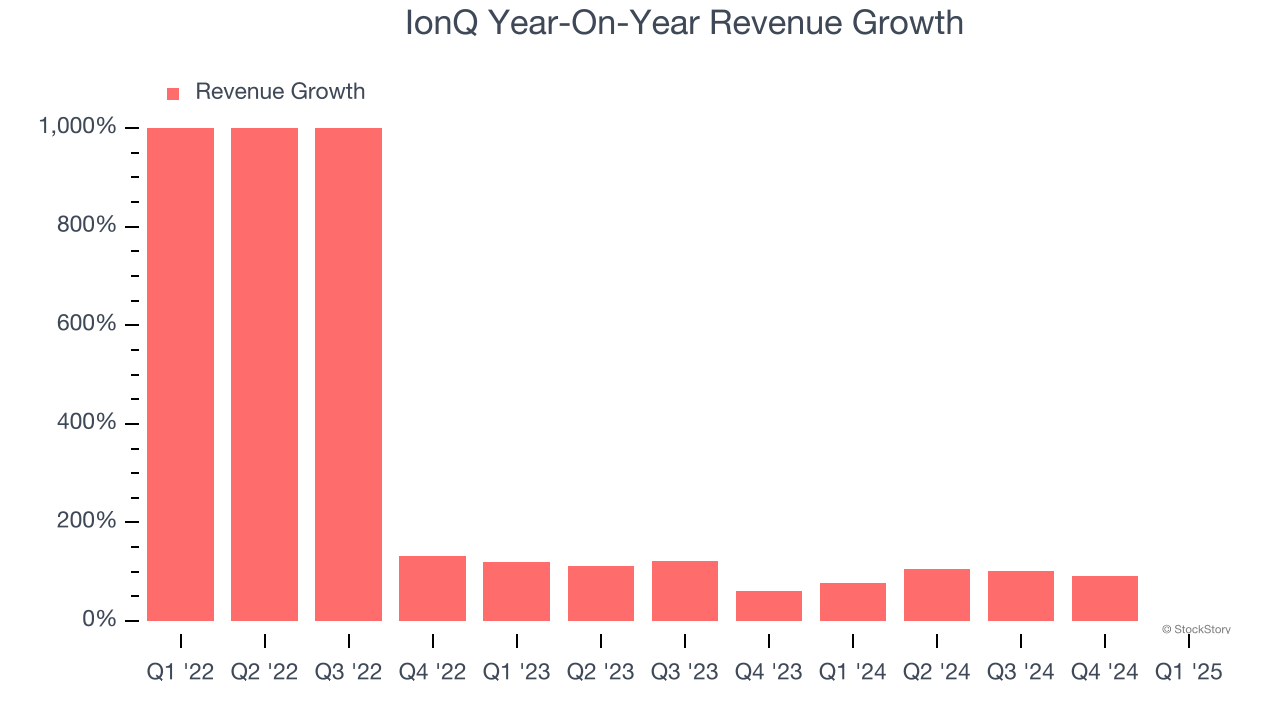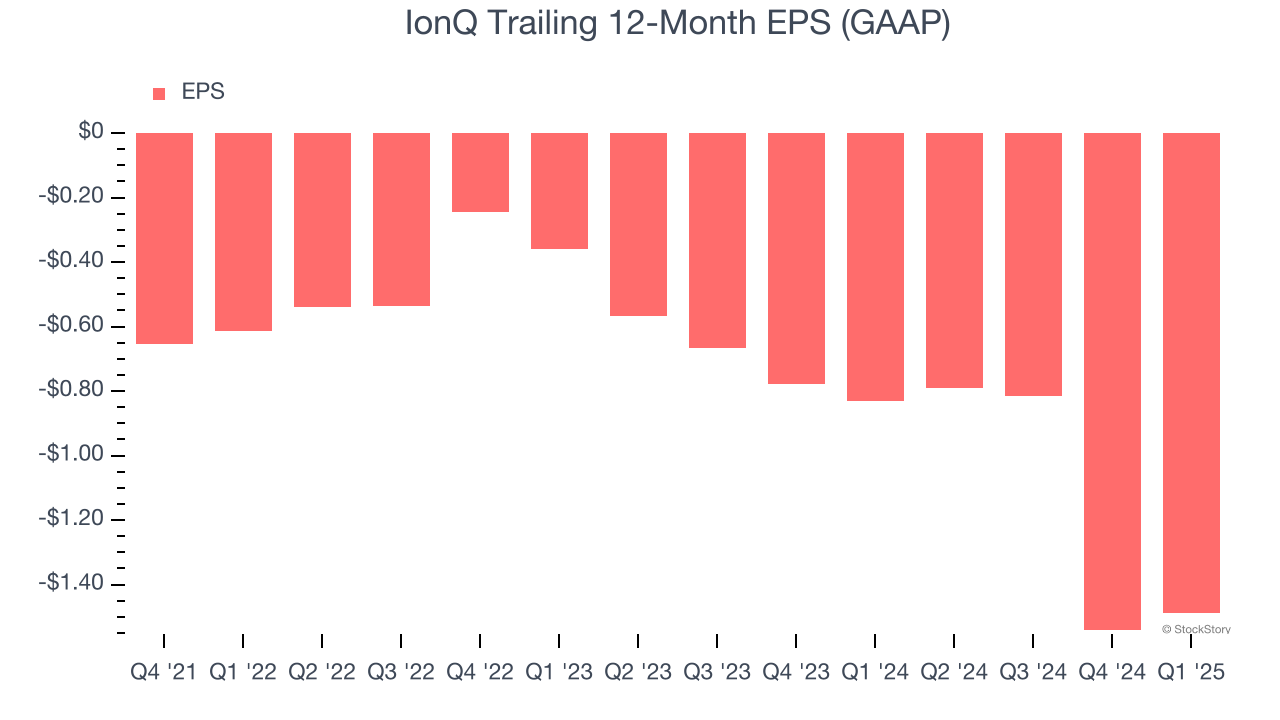
Quantum computing company IonQ (NYSE: IONQ) reported Q1 CY2025 results exceeding the market’s revenue expectations, but sales were flat year on year at $7.57 million. On top of that, next quarter’s revenue guidance ($18 million at the midpoint) was surprisingly good and 8.1% above what analysts were expecting. Its GAAP loss of $0.14 per share was 52.5% above analysts’ consensus estimates.
Is now the time to buy IonQ? Find out by accessing our full research report, it’s free.
IonQ (IONQ) Q1 CY2025 Highlights:
- Revenue: $7.57 million vs analyst estimates of $7.50 million (flat year on year, 0.9% beat)
- EPS (GAAP): -$0.14 vs analyst estimates of -$0.30 (52.5% beat)
- Adjusted EBITDA: -$35.81 million vs analyst estimates of -$32.09 million (-473% margin, 11.6% miss)
- The company reconfirmed its revenue guidance for the full year of $95 million at the midpoint
- IONQ pulled its EBITDA guidance
- Operating Margin: -1,000%, down from -697% in the same quarter last year
- Free Cash Flow was -$36.22 million compared to -$23.61 million in the same quarter last year
- Market Capitalization: $7.03 billion
Company Overview
Founded by quantum physics pioneers from the University of Maryland and Duke University in 2015, IonQ (NYSE: IONQ) develops quantum computers that process information using trapped ions to solve complex computational problems beyond the capabilities of traditional computers.
Sales Growth
A company’s long-term sales performance is one signal of its overall quality. Any business can put up a good quarter or two, but the best consistently grow over the long haul.
With $43.06 million in revenue over the past 12 months, IonQ is a small player in the business services space, which sometimes brings disadvantages compared to larger competitors benefiting from economies of scale and numerous distribution channels. On the bright side, it can grow faster because it has more room to expand.
As you can see below, IonQ grew its sales at an incredible 122% compounded annual growth rate over the last three years. This is an encouraging starting point for our analysis because it shows IonQ’s demand was higher than many business services companies.

We at StockStory place the most emphasis on long-term growth, but within business services, a stretched historical view may miss recent innovations or disruptive industry trends. IonQ’s annualized revenue growth of 78.8% over the last two years is below its three-year trend, but we still think the results suggest healthy demand. 
This quarter, IonQ’s $7.57 million of revenue was flat year on year but beat Wall Street’s estimates by 0.9%. Company management is currently guiding for a 58.2% year-on-year increase in sales next quarter.
Looking further ahead, sell-side analysts expect revenue to grow 139% over the next 12 months, an improvement versus the last two years. This projection is eye-popping and suggests its newer products and services will fuel better top-line performance.
Here at StockStory, we certainly understand the potential of thematic investing. Diverse winners from Microsoft (MSFT) to Alphabet (GOOG), Coca-Cola (KO) to Monster Beverage (MNST) could all have been identified as promising growth stories with a megatrend driving the growth. So, in that spirit, we’ve identified a relatively under-the-radar profitable growth stock benefiting from the rise of AI, available to you FREE via this link.
Operating Margin
Operating margin is a key measure of profitability. Think of it as net income - the bottom line - excluding the impact of taxes and interest on debt, which are less connected to business fundamentals.
IonQ’s high expenses have contributed to an average operating margin of negative 687% over the last four years. Unprofitable business services companies require extra attention because they could get caught swimming naked when the tide goes out.
On the plus side, IonQ’s operating margin rose over the last four years, as its sales growth gave it operating leverage. Still, it will take much more for the company to reach long-term profitability.
This quarter, IonQ generated a negative 1,000% operating margin.
Earnings Per Share
Revenue trends explain a company’s historical growth, but the change in earnings per share (EPS) points to the profitability of that growth – for example, a company could inflate its sales through excessive spending on advertising and promotions.
IonQ’s earnings losses deepened over the last three years as its EPS dropped 34.4% annually. We’ll keep a close eye on the company as diminishing earnings could imply changing secular trends and preferences.

In Q1, IonQ reported EPS at negative $0.14, up from negative $0.19 in the same quarter last year. This print easily cleared analysts’ estimates, and shareholders should be content with the results. Over the next 12 months, Wall Street expects IonQ to improve its earnings losses. Analysts forecast its full-year EPS of negative $1.49 will advance to negative $1.17.
Key Takeaways from IonQ’s Q1 Results
We were impressed by how significantly IonQ blew past analysts’ revenue and EPS expectations this quarter. We were also glad its full-year revenue guidance trumped Wall Street’s estimates, although it pulled its EBITDA guidance. This quarter's EBITDA also missed. Zooming out, we think this quarter was mixed. The stock traded up 1.6% to $29.65 immediately after reporting.
IonQ may have had a good quarter, but does that mean you should invest right now? We think that the latest quarter is only one piece of the longer-term business quality puzzle. Quality, when combined with valuation, can help determine if the stock is a buy. We cover that in our actionable full research report which you can read here, it’s free.




